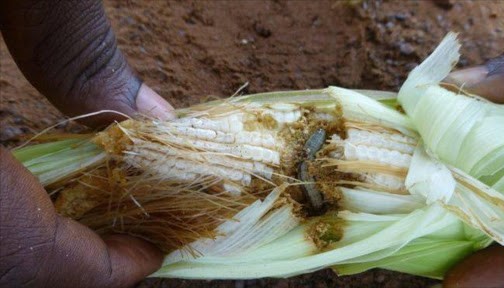The fight against the spread of the Fall armyworm in Africa in general and the west and central Africa in particular has moved from the level of planning to concrete action, development and research organisations in the continent have said.

Meeting at a high-level conference on controlling Fall armyworm in west and central Africa in Yaoundé, Cameroon, the different stakeholders agreed it was time to double step with multiple actions to stop the rapid spread and destruction of the invasive pest.
Reports presented during the conference noted that armyworm is expected to spread throughout suitable habitats in mainland sub-Saharan Africa within the next few cropping seasons if not properly controlled. Central, West, Northern Africa and Madagascar are all at risk, the report noted.
With the current rate of spread, armyworm has become a threat to the food security of over 300million people in sub-Saharan Africa, with rural people most affected.
Agriculture authorities in Cameroon say the larvae of the nondescript grey moths has been spreading rapidly hatching and eating their way through the fields of young maize and millet, threatening the food crops supply not only in Cameroon but the entire Central African Economic Commission (CEMAC) region.
“The damage has been rapid affecting both farmers and business operators in the sector. This is not good news,” Louisette Clemence Bamzok, head of agriculture development at the ministry of agriculture and rural development in Cameroon, said.
The authorities are worried the pesticides applied by farmers so far have not yielded the expected results. A new plan of action in collaboration with partners has been launched.
“The pest seems to be resistant to pesticides and other chemical products distributed to farmers. We are working with the Institute of Agricultural Research for Development (IRAD) to find a lasting solution,” says Louisette Clemence Bamzok.
A report by the Food and Agriculture Organisation (FAO) says farmers will need great support to sustainably manage the pest in their cropping systems through Integrated Pest Management.
FAO has launched the Fall Armyworm Monitoring and Early Warning System (FAMEWS) mobile app that will hence provide valuable insights to enable Africn farmers, agricultural workers and other partners better fight against the pest.
According to Jean-Baptiste Bahama of the FAO, the operationalisation of National Task Force on fall armyworm is key to efficiently coordinating preparedness and response through contingency planning.
“FAO has responded to the fall armyworm situation in Africa by developing tools, resources, installing capacity for fall armyworm early warning system (FAMEWS), and developing and coordinating pesticide policies at national, regional and global levels,” Bahama said.
“The time is now to invest in a sustainable, effective response to FAW in Africa. The only thing missing are the resources to scale-up and scale-out this important work,” he added.
To AfDB’s country Manager for Cameroon, Solomane Kone and Chrys Akem, TAAT Programme Coordinator at the International Institute for Tropical Agriculture (IITA), this is where the AfDB comes in through the Technologies for African Agricultural Transformation (TAAT) programme.
The government of Cameroon on its part says they are leaving no stone unturned.
“We are multiplying efforts and hope a solution will be found timeously,” Clementine Ananga said at the launch of the new plan in March 2018.
The plan calls for the certification of two pesticides with appeal for financial support and participation of the private sector and international partners.
The FAO has disbursed CFA120 million, the Minister said during the launch. Government hopes the programme to be implemented for 18 months will help put an end to ravages of the fall armyworm.
But these promises, and plans seem to do little to quell the fears and anguish of farmers and business operators in the sector.
“We hope the announced government plan in not just another talking therapy. We want to see it implemented and get the results,” says Bernard Njonga.
Courtesy: PAMACC News Agency
